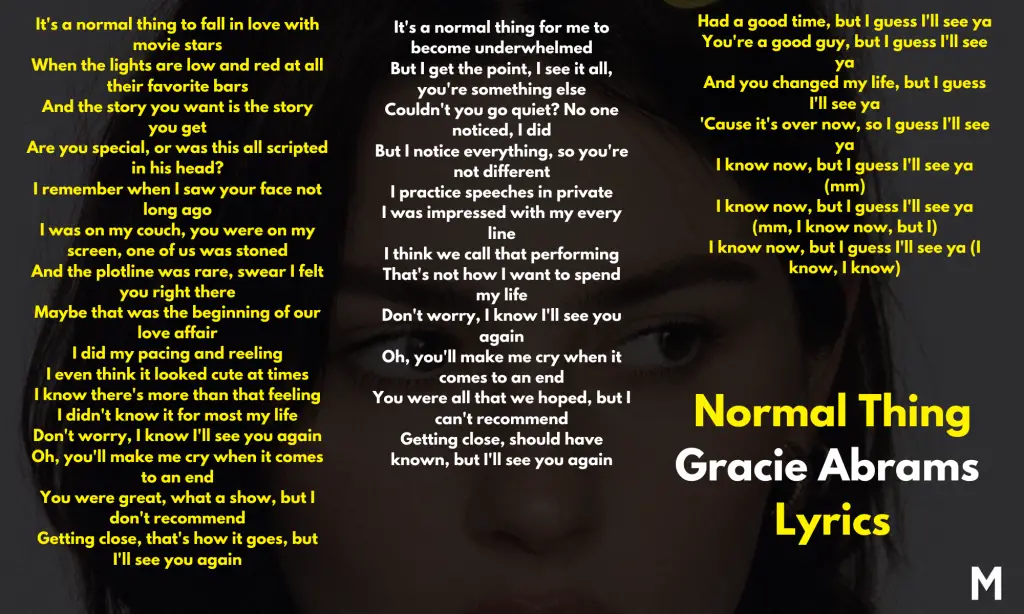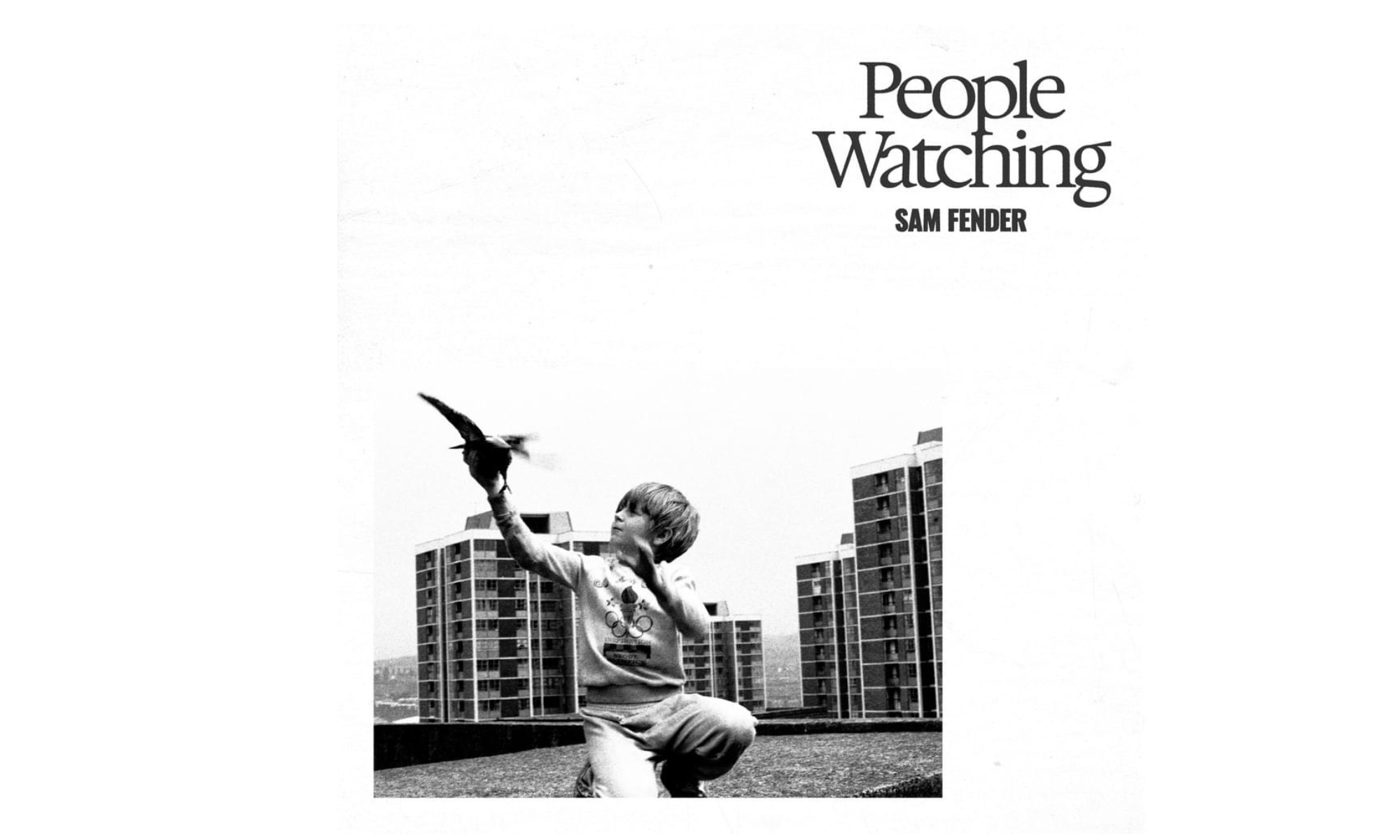Table of Contents
Image Courtesy Of Interscope Records
Gracie Abrams‘ “Normal Thing” is one of those songs that’s easy to hear and immediately relate to. On the surface, it’s about falling for someone who feels just out of reach—a movie star, a performer, someone whose life feels larger than your own. The details Abrams uses are so clear: watching from a couch, imagining connection through a screen, and questioning whether the love is real or just another story playing out in someone’s head. There’s a quiet self-awareness in these lyrics that sets them apart. Abrams seems to know exactly what she’s doing as she blurs the lines between love, illusion, and performance.
Now, I’ll be honest—if you’ve been anywhere near the Gracie Abrams fan theories, you’ve probably heard whispers about this song being connected to Normal People star Paul Mescal. The “movie star” references? The title that might nod to Normal People itself? It’s hard to ignore. While I’m not here to speculate too much about who the song’s about, I think this is a great excuse to dig into the lyrics and stretch the literary comparisons a little. Abrams gives us timeless ideas here—things people have been writing about for generations—wrapped in a modern and incredibly relatable story. I’ll be using my background in English lit and creative writing to take a closer look at the lyrics, breaking down what they reveal about love, connection, and that bittersweet feeling of knowing something was never meant to last.
“Normal Thing” at a Glance
- It’s about loving someone you don’t really know. The speaker falls for a movie star or performer, someone whose life is built on stories and scripts—leaving the lines between fantasy and reality blurred.
- The lyrics are self-aware and bittersweet. Abrams acknowledges that the “love” feels like a performance but leans into the emotional weight of it anyway. It’s real, even if it’s imagined.
- It taps into that feeling of quiet endings. The repeated “I’ll see you again” feels like both a goodbye and a promise to keep coming back to those same feelings.
Gracie Abrams Normal Thing Lyrics

Gracie Abrams Normal Thing Meaning
“It’s a normal thing to fall in love with movie stars”
The song begins with a simple truth: “It’s a normal thing to fall in love with movie stars.” Right away, the speaker sets the tone—this is about loving someone who feels completely out of reach. The “movie stars” aren’t just literal here. They represent anyone who seems perfect and unattainable, someone who we see only in the best light. The lines that follow—“The story you want is the story you get / Are you special, or was this all scripted in his head?”—show us that the speaker knows this love might not be real. Instead, it’s a story they’re creating in their own mind.
This reminds me of Frank Bidart’s “Ellen West.” In that poem, Ellen struggles with trying to live up to an ideal that feels out of reach. She says, “I want to live but cannot.” That tension between what’s real and what’s imagined mirrors what the speaker in this song is going through. They’re in love with an idea, not a real person. By asking, “Are you special?” the speaker questions whether this feeling is unique or just part of the illusion they’ve created.
The honesty in these lines is what makes them so relatable. The speaker isn’t pretending they don’t know better—they see the “script” for what it is. But that doesn’t make the feeling any less real. Sometimes, we choose to hold onto the fantasy because it’s easier than facing the truth.
“I remember when I saw your face not long ago”
Here, the speaker tells us how this imagined connection began: “I remember when I saw your face not long ago / I was on my couch, you were on my screen, one of us was stoned.” This image is so clear and ordinary. They were alone, sitting on their couch, watching someone on a screen. That’s the reality of this relationship—it’s one-sided. The other person doesn’t know the speaker exists, but for a moment, it feels real to them. The line “swear I felt you right there” shows how strong that illusion can be.
This is similar to Anne Sexton’s “The Truth the Dead Know.” In that poem, Sexton writes about loss with a tone that feels distant and quiet. She says, “The dead do not care. / They have given up their tongue.” There’s a disconnect in those lines, just like there’s a disconnect in this song. The speaker feels close to the person on their screen, but deep down, they know it’s not real. That gap between what we feel and what’s actually happening can be painful.
The detail about “one of us was stoned” is important, too. It adds to the haziness of the moment. The speaker knows they’re not really connected to this person, but they let themselves believe it for a little while. It’s a reminder of how easy it is to blur the line between reality and fantasy, especially when we’re looking for something to hold onto.
“I did my pacing and reeling / I even think it looked cute at times”
This is where the speaker starts looking inward. They say, “I did my pacing and reeling / I even think it looked cute at times.” These lines are so self-aware. The speaker knows they’re acting out their emotions—pacing around, overthinking everything—and they can even step outside of themselves to see it. They say it looked “cute,” like they’re watching themselves from the outside, playing a role in their own life.
This ties perfectly to W.H. Auden’s “The Unknown Citizen.” Auden writes about a man who seems perfect on paper but whose inner life is completely unknown. He says, “Was he free? Was he happy? The question is absurd.” Like Auden’s citizen, the speaker in this song starts to feel like they’re just performing for an audience—even if no one else is watching. That’s the tricky part about infatuation: it can start to feel like a show we put on for ourselves.
The next line—“I know there’s more than that feeling / I didn’t know it for most my life”—shows growth. The speaker realizes that real love has to be deeper than this. For most of their life, they’ve been chasing feelings that don’t last, getting caught up in fantasies instead of seeking something real. But now they’re starting to understand the difference, even if they’re still stuck in the habit of performing.
“Don’t worry, I know I’ll see you again”
This chorus hits hard. The speaker says, “Don’t worry, I know I’ll see you again.” It sounds comforting, but there’s a sadness underneath. They know they’ll keep coming back to this feeling—maybe rewatching a show, replaying a memory, or falling into the same emotional patterns. The line “You were great, what a show, but I don’t recommend / Getting close, that’s how it goes” is so honest. The speaker knows this connection wasn’t real, but they still felt it. That’s what makes it so hard to let go.
This reminds me of Anne Sexton’s quiet grief in “The Truth the Dead Know.” She writes about endings with the same kind of understatement: “We are not to make a judgment / of a woman’s life.” Sexton doesn’t dramatize her sadness, and neither does the speaker in this song. The repeated “I’ll see you again” is bittersweet because it’s both an ending and a promise.
The speaker knows it’s not healthy to get too close to something that isn’t real, but they also can’t completely walk away. It’s like a habit they can’t break. Even when the “show” is over, they know they’ll come back for more.
“Had a good time, but I guess I’ll see ya”
The ending of the song is so powerful because it’s so simple. The speaker says, “Had a good time, but I guess I’ll see ya / You’re a good guy, but I guess I’ll see ya / And you changed my life, but I guess I’ll see ya.” These lines repeat over and over, almost like a goodbye they don’t really want to say. It’s casual on the surface, but there’s so much underneath. The speaker is admitting that this connection—real or not—mattered to them.
This reminds me again of Frank Bidart’s “Ellen West.” Ellen feels stuck between her desires and reality, and she says, “I wanted to live, but I wanted to die.” The speaker in this song feels that same tension. They know this love was imagined, but it still meant something. They can’t just pretend it didn’t happen.
The repetition of “I guess I’ll see ya” feels like they’re trying to let go while holding on at the same time. The connection is over, but the feelings remain. That’s what makes this song so relatable—sometimes even the stories we create in our heads can change us.
Connecting All The Dots
Gracie Abrams’ “Normal Thing” hits on themes of love, illusion, and the strange ways we connect to people we don’t really know. It’s about falling for someone who exists at a distance—a movie star, a performer, or just someone whose life feels untouchable. The line “I was on my couch, you were on my screen, one of us was stoned” perfectly captures this: one person’s living their real life while the other becomes part of someone’s daydream. There’s a bittersweet honesty in the way Abrams writes about this imagined connection. Fans have speculated that these lyrics could nod to her rumored relationship with Normal People star Paul Mescal—especially with phrases like “movie stars” and the title “Normal Thing,” which may play on the name of the show that made Mescal a household name. Whether intentional or not, Abrams uses this story to explore a bigger truth: sometimes the love we invent feels just as real as the kind we live.
This disconnect between fantasy and reality ties beautifully to Frank Bidart’s “Ellen West.” In Bidart’s poem, Ellen feels trapped between her inner desires and the life she’s expected to perform. She says, “I want to live but cannot.” It’s that same tension we see in Abrams’ lyrics—where the speaker knows the connection isn’t real but still finds themselves performing love, pacing and reeling as if it were.
The line “I think we call that performing / That’s not how I want to spend my life” shows Abrams’ speaker grappling with that self-awareness. They’re stuck in this role they know isn’t authentic, but it’s hard to let go when the feelings are so strong.
Anne Sexton’s “The Truth the Dead Know” adds another layer to this. Sexton writes about endings in a way that’s quiet and unflinching, saying, “We are not to make a judgment / of a woman’s life.” Abrams echoes that understated grief in her repeated line “I guess I’ll see ya.” It’s casual on the surface, but underneath, there’s resignation. The connection—whether imagined or real—is over, and the speaker knows it. Still, they can’t quite let go. It’s a goodbye and a promise to come back to those same feelings, much like Sexton leaves room for her loss to just be without turning it into a dramatic performance.
The beauty of “Normal Thing” is in its honesty: even when we know love or connection is built on illusion, it still matters. It’s still real to the person feeling it. And that’s the quiet truth Abrams captures so well here.
Will Vance is a professional music producer who has been involved in the industry for the better part of a decade and has been the managing editor at Magnetic Magazine since mid-2022. In that time period, he has published thousands of articles on music production, industry think pieces and educational articles about the music industry. Over the last decade as a professional music producer, Will Vance has also ran multiple successful and highly respected record labels in the industry, including Where The Heart Is Records as well as having launched a new label with a focus on community through Magnetic Magazine. When not running these labels or producing his own music, Vance is likely writing for other top industry sites like Waves or the Hyperbits Masterclass or working on his upcoming book on mindfulness in music production. On the rare chance he's not thinking about music production, he's probably running a game of Dungeons and Dragons with his friends which he has been the dungeon master for for many years.









